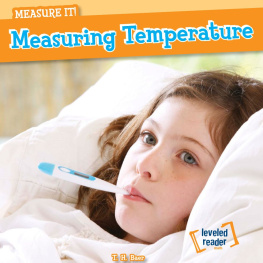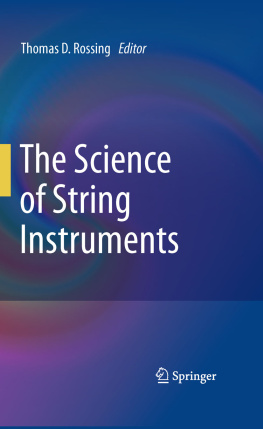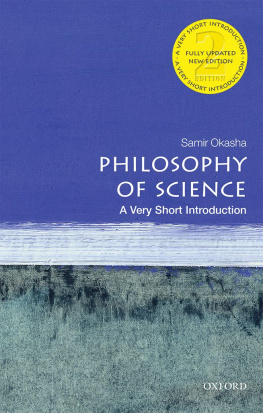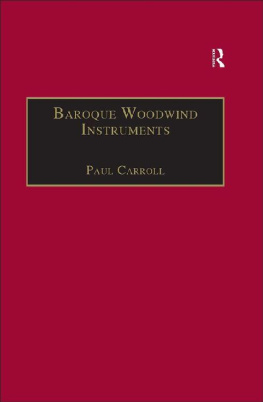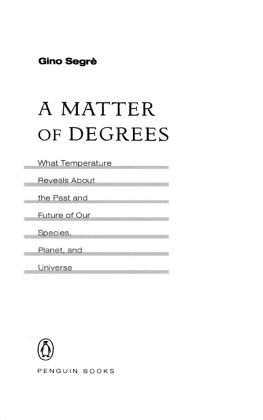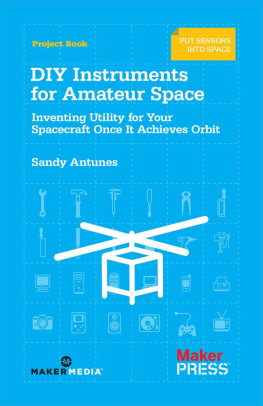
Chang, Hasok Lecturer in the Department of Science and Technology Studies, University College London
Inventing Temperature
Measurement and Scientific Progress
Publication date 2004 (this edition)
Print ISBN-10: 0-19-517127-6
Print ISBN-13: 978-0-19-517127-3
doi:10.1093/0195171276.001.0001
Abstract: This book presents the concept of "complementary science" which contributes to scientific knowledge through historical and philosophical investigations. It emphasizes the fact that many simple items of knowledge that we take for granted were actually spectacular achievements obtained only after a great deal of innovative thinking, painstaking experiments, bold conjectures, and serious controversies. Each chapter in the book consists of two parts: a narrative part that states the philosophical puzzle and gives a problem-centred narrative on the historical attempts to solve the puzzle; and the analysis part which provides in-depth analyses of certain scientific, historical, and philosophical aspects of the story.
Keywords: complementary science,scientific knowledge,history,philosophy of science
Inventing Temperature
end p.i
Oxford Studies in Philosophy of Science
General Editor: Paul Humphreys, University of Virginia
The Book of Evidence
Peter Achinstein
Science, Truth, and Democracy
Philip Kitcher
The Devil in the Details: Asymptotic Reasoning in Explanation, Reduction, and Emergence
Robert W. Batterman
Science and Partial Truth: A Unitary Approach to Models and Scientific Reasoning
Newton C. A. da Costa and Steven French
Inventing Temperature: Measurement and Scientific Progress
Hasok Chang
end p.ii
Inventing Temperature
Measurement and Scientific Progress
end p.iii
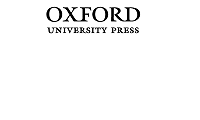
Oxford New York
Auckland Bangkok Buenos Aires Cape Town Chennai
Dar es Salaam Delhi Hong Kong Istanbul Karachi Kolkata
Kuala Lumpur Madrid Melbourne Mexico City Mumbai Nairobi
So Paulo Shanghai Taipei Tokyo Toronto
Copyright 2004 by Oxford University Press, Inc.
Published by Oxford University Press, Inc.
198 Madison Avenue, New York, New York 10016
www.oup.com
Oxford is a registered trademark of Oxford University Press
All rights reserved. No part of this publication may be reproduced, stored in a retrieval system, or transmitted, in any form or by any means, electronic, mechanical, photocopying, recording, or otherwise, without the prior permission of Oxford University Press.
Library of Congress Cataloging-in-Publication Data
Chang, Hasok.
Inventing temperature : measurement and scientific progress / Hasok Chang.
p. cm.(Oxford studies in philosophy of science)
Includes bibliographical references and index.
ISBN 0-19-517127-6
1. Temperature measurementsHistory. 2. ThermometersHistory.
3. Interdisciplinary approach to knowledge. 4. SciencePhilosophy.
I. Title. II. Series.
QC271.6.C46 2004
536.50287dc22 2003058489
2 4 6 8 9 7 5 3 1
Printed in the United States of America
on acid-free paper
end p.iv
end p.vi
Acknowledgments
As this is my first book, I need to thank not only those who helped me directly with it but also those who helped me become the scholar and person who could write such a book.
First and foremost I thank my parents, who raised me not only with the utmost love and intellectual and material support but also with the basic values that I have proudly made my own. I would also like to thank them for the faith and patience with which they supported even those of my life decisions that did not fit their own visions and hopes of the best possible life for me.
While I was studying abroad, there were many generous people who took care of me as if they were my own parents, particularly my aunts and uncles Dr. and Mrs. Young Sik Jang of Plattsburgh, N.Y., and Mr. and Mrs. Chul Hwan Chang of Los Angeles. Similarly I thank my mother-in-law, Mrs. Elva Siglar.
My brother and sister have not only been loving siblings but emotional and intellectual guiding lights throughout my life. They also had the good sense to marry people just as wonderful as themselves, who have helped me in so many ways. My loving nieces and nephews are also essential parts of this family without whom I would be nothing. In the best Korean tradition, my extended family has also been important, including a remarkable community of intellectual cousins.
The long list of teachers who deserve the most sincere thanks begins with Mr. Jong-Hwa Lee, my first-grade teacher, who first awakened my love of science. I also thank all the other teachers I had at Hong-Ik Elementary School in Seoul. I would like to record the most special thanks to all of my wonderful teachers at Northfield Mount Hermon School, who taught me to be my own whole person as well as a scholar. To be thanked most directly for their influences on my eventual intellectual path are Glenn Vandervliet and Hughes Pack. Others that I cannot go without mentioning include Jim Antal, Fred Taylor, Yvonne Jones, Vaughn Ausman, Dick and Joy Unsworth, Mary and Bill Compton, Juli and Glenn Dulmage, Bill Hillenbrand, Meg Donnelly, James Block, and the late Young Il Shin. There is something I once promised to say, and I will say it now in case I never achieve
end p.vii
anything better than this book in my life: "Northfield Mount Hermon has made all the difference."
As an undergraduate at Caltech, I was very grateful to be nurtured by the excellent Division of the Humanities and Social Sciences. I would not have become a scholar in the humanities, or even survived college at all, without the tutelage and kindness of the humanists, especially Bruce Cain, Robert Rosenstone, Dan Kevles, Randy Curren, Nicholas Dirks, and Jim Woodward (whom I have the honor of following in the Oxford Studies series). The SURF program at Caltech was also very important. My year away at Hampshire College changed my intellectual life so significantly, and I would like to thank Herbert Bernstein and Jay Garfield particularly.
I went to Stanford specifically to study with Nancy Cartwright and Peter Galison, and ever since then they have been so much more than Ph.D. advisors to me. They have opened so many doors into the intellectual and social world of academia that I have completely lost count by now. What I did not know to expect when I went to Stanford was that John Dupr would leave such a permanent mark on my thinking. I would also like to thank many other mentors at Stanford including Tim Lenoir, Pat Suppes, Marleen Rozemond, and Stuart Hampshire, as well as my fellow graduate students and the expert administrators who made the Philosophy Department such a perfect place for graduate work.
Gerald Holton, the most gracious sponsor of my postdoctoral fellowship at Harvard in 1993-94, has taught me more than can be measured during and since that time. My association with him and Nina Holton has been a true privilege. I also thank Joan Laws for all her kindness and helpful expertise during my time at Harvard.



